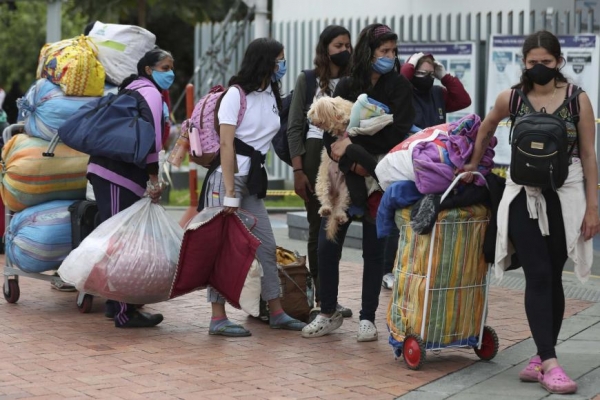Refugees and internally displaced people (IDPs) are among the most vulnerable categories in the world. These people had to face several challenges even before the Covid-19 pandemic, as they are forced to leave their home, they often have limited access to work and education and they are usually exposed to abuse and violence. The Norwegian Refugee Council’s (NRC) latest report, released in September 2020, investigates how some governmental anti-Covid measures further exacerbated the drastic condition of refugees and IDPs. NRC’s research is based on a survey of 1,400 people affected by displacement and conflict in eight countries.
The main consequence of anti-Covid measures for these vulnerable categories was a dramatic loss of income. In fact, 77 per cent of the interviewees said that they had lost their source of income – either temporarily or permanently – since the beginning of the pandemic in March. 62 per cent of the respondents who used to receive remittances from family members abroad claimed that they were receiving much less than before the pandemic, and 30 per cent said that they had to borrow more money than before. This dramatic loss of income resulted in further problems: 77 per cent of the interviewees said that they had to cut their medical expenses; 71 per cent had difficulty paying their rent and 47 per cent were evicted since the start of the pandemic. The impact of the pandemic often overlaps with existing problems for vulnerable people: refugees and IDPs already lived in overcrowded and substandard accommodations, with a higher risk of contracting Covid-19 due to the inadequate hygienic conditions. As NRC’s research underlines, adequate housing is increasingly unavailable for these people.
Even before the Covid-19 pandemic, IDPs and refugees experienced high levels of food insecurity. Their condition was furtherly aggravated by the pandemic and anti-Covid measures. NRC’s research, in fact, found that three-quarters of the respondents had to cut the number of meals for their household since the beginning of the pandemic. According to UNICEF, the number of children suffering from acute malnutrition in West Africa will have a 20 per cent increase due to the pandemic. Furthermore, its economic impact is causing considerable distress to IDPs and refugees, leading to what the United Nations defined as a “mental health crisis” associated with the pandemic. The economic consequences of the pandemic are not equally distributed either. For instance, women are more impacted than men in contexts where they are more likely to have precarious, informal jobs. As NRC’s study shows, 52 per cent of women permanently lost their jobs in Iraq due to the pandemic, compared with only 34 per cent of men.
NRC’s report provides several recommendations to the stakeholders involved. First of all, it urges national governments to include refugees and IDPs in their national economic stimulus plans and to order a moratorium on evictions. Secondly, the report suggests that the G-20 should commit to a dramatic scale-up of assistance for vulnerable countries and promote debt relief initiatives for the ones with large amounts of IDPs and refugees. Finally, it recommends that humanitarian organizations should cooperate with national authorities, the private sector and multilateral development banks to scale up assistance to the most vulnerable categories.
To read more, please visit:
https://www.nrc.no/globalassets/pdf/reports/nrc_downward-spiral_covid-19_report.pdf
Author: Margherita Curti; Editor: Matteo Consiglio







